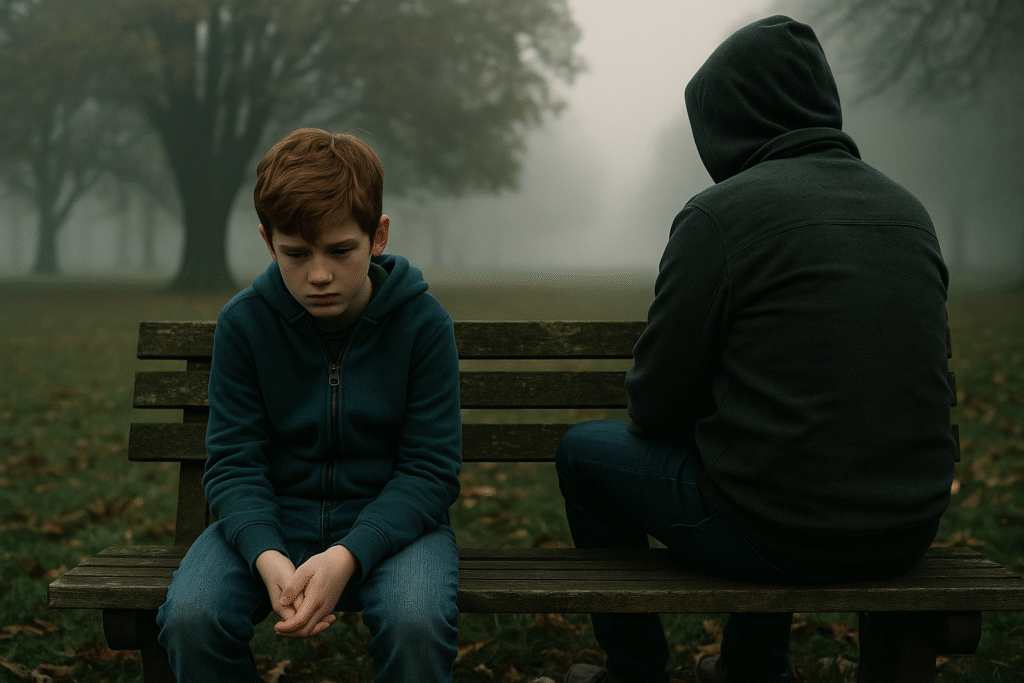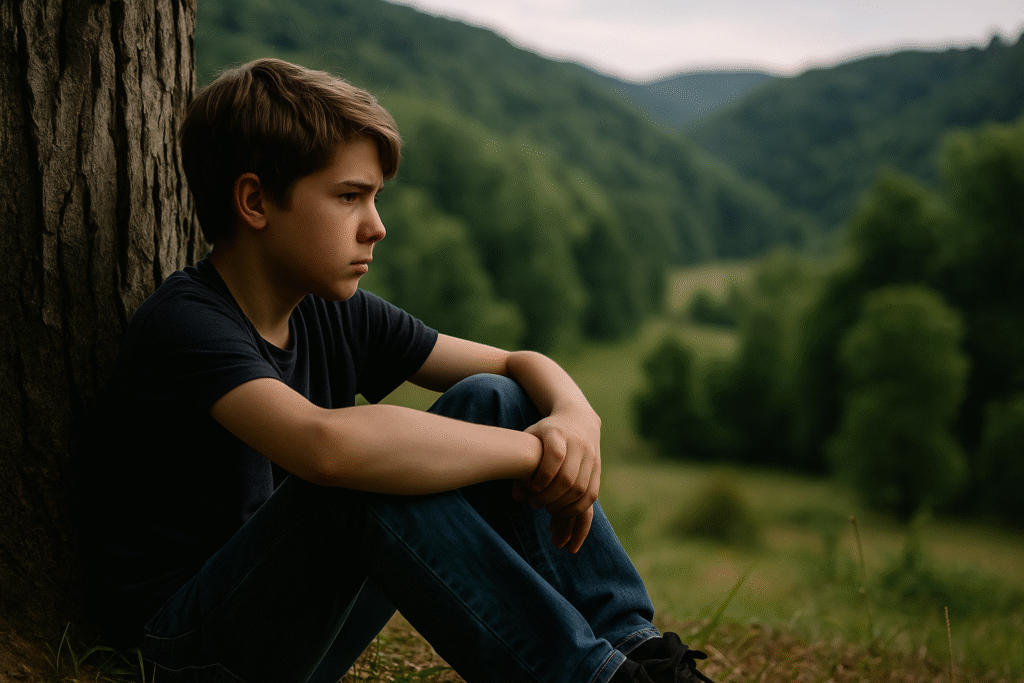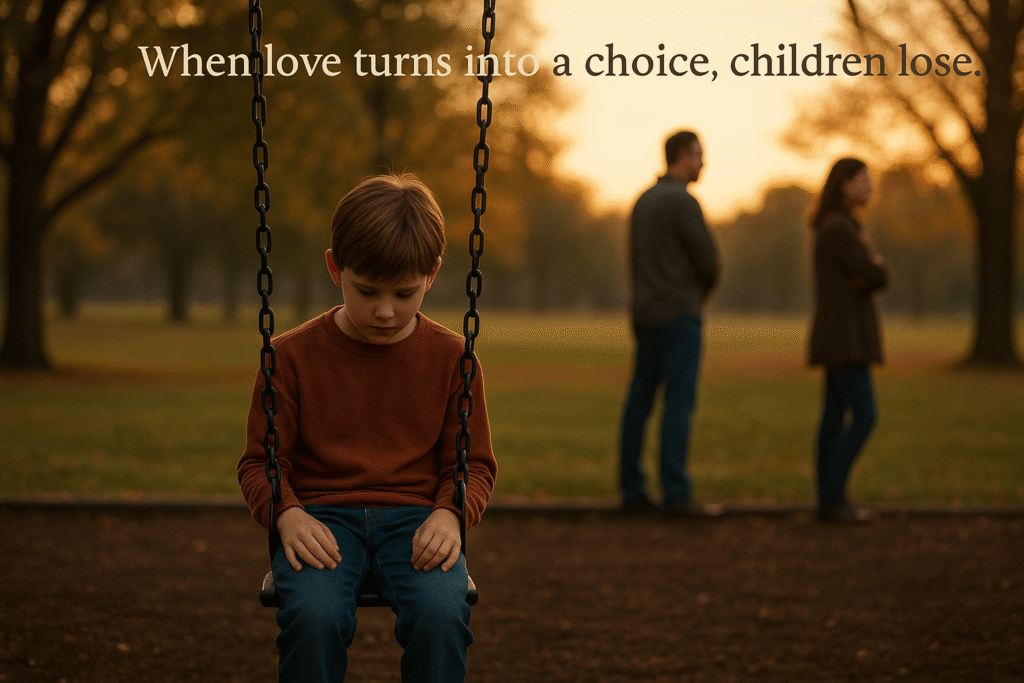It is a natural instinct, perhaps one of the oldest and most tender, to try and shield our children from the difficult things, the things we ourselves struggle to carry, let alone explain. We want to protect them from the sharp edges of the world: the losses that have no language, the pressures that wake us at 3 a.m., the heaviness that sometimes settles on our shoulders like a fog we can’t shake. And so we hide it. Not because we are dishonest, but because we love them. Because we want their world to remain bright and light and intact for as long as possible.
Often, we choose silence. Not because we don’t care, but because we don’t want to hand them the map of our sadness. We tell ourselves it’s better this way—to close the door softly when we cry in the next room, to brush off their questions with “I’m just tired,” to smile through the numbness in hopes they’ll never notice. And yet, even in that quiet, something reaches them. Not through our words, but through the small ruptures in our presence. They notice the slowness in our gestures, the way our gaze lingers without landing, the way joy feels thinner in the room when we enter.
And because they do not yet have the developmental language to separate our inner struggles from their sense of self, they begin—often unconsciously—to turn that absence inward. They start to wonder what they did wrong. They begin to shape themselves around our pain, attempting to soften the world for us in the only ways they know: by becoming more obedient, more quiet, more helpful, more invisible—or, at times, more disruptive, in desperate hope that someone might finally notice that something is off.
This is not a failure of parenting. It is a wound of unprocessed pain. And it happens, far more often than we admit, in homes where love is present—but presence is not.
How Children React to Emotional Absence: The Two Paths
When a child lives with an emotionally unavailable parent—especially one affected by depression—there are usually two roads they begin to walk. Sometimes the difference is visible to everyone. Sometimes it lives quietly in their nervous system, only revealing itself years later in the way they trust, connect, or cope with stress.
Some children, in their longing to restore closeness, respond by becoming impossibly good. They polish themselves like armor: perfect grades, impeccable manners, trophies lined neatly on the shelf. Their compliance becomes their currency. If they can just be enough—bright enough, helpful enough, successful enough—maybe they’ll bring the light back into their parent’s eyes. This isn’t ambition. It’s grief in disguise. It’s hope with a high cost.
Others choose the second path—not consciously, but with the same aching urgency. If goodness won’t bring a parent back, perhaps power will. These are the children who begin to act out: angry, disruptive, seemingly unreachable. They draw attention by breaking rules, hurting others, or shutting down entirely. What we call defiance is often unprocessed hurt. What looks like aggression is sometimes a desperate attempt to be seen.
In psychological terms, these are known as internalizing and externalizing responses to emotional neglect. Studies have shown that children of depressed parents are significantly more likely to develop anxiety, perfectionism, or somatic symptoms on the one hand—or oppositional behavior, impulsivity, and academic decline on the other.
Jake and Michael: When the Father Vanishes, the Anger Takes His Place
In The Chrysalis, this split lives inside Jake Dawson.
At the surface, he’s the bully—the boy who pushes others to the edge, who mocks, fights, and isolates. But beneath that, he is simply a boy whose father disappeared without leaving. Michael, once successful, respected, and central to the family’s life, crumbles into depression after the loss of his career. His guilt becomes his cage. His presence fades into a ghost. He’s there, but unreachable. And Jake, left without answers or repair, begins to carry that weight in the only way he knows: with fists, sarcasm, and fire.
What the reader sees—but Jake doesn’t know how to say—is that his behavior is a language. It is the voice of a boy who has been emotionally abandoned. He lashes out not because he doesn’t care, but because no one showed him how to mourn what’s missing.
We see this contrast most clearly in The Chrysalis, through the two boys at its heart: Leo and Jake. Leo responds to fear by folding inward. He watches the world carefully, his body small, his voice tentative, his thoughts always scanning for safety. He tries to stay invisible, to earn peace by being good, by being quiet, by never asking for too much. His pain doesn’t explode—it contracts.
Jake, on the other hand, is all sharp edges and sound. His grief doesn’t go underground—it breaks the surface in the form of control, confrontation, and force. Where Leo retreats, Jake lunges. Where Leo seeks safety, Jake seeks dominance. His father’s emotional absence left a wound he could not explain, so he filled the silence with anger. He became the storm no one could ignore, because being feared felt closer to being seen than being forgotten.
And yet, despite their differences, both boys are responding to the same core wound: the absence of a steady, emotionally present adult. One chooses invisibility. The other chooses power. But both are trying, in the only ways they know, to survive the ache of disconnection.
The Slow Return to Presence
You don’t need to be whole to begin again. But you do need to be willing.
There is a moment—often quiet, often private—when a parent realizes that their absence has left a mark. It may come in the form of a child’s silence, or a slammed door, or the aching awareness that something soft between you has hardened. It may come slowly, through the growing space between conversations. Or it may arrive all at once, like a mirror held to your chest, revealing how long you’ve been surviving instead of living.
Whatever form it takes, it begins with this: an honest look inward.
Before repair begins, there must be awareness. A willingness to ask—not in shame, but in care—Am I okay? And if I’m not… what needs tending?
Sometimes what we call “burnout” is something more chronic. Sometimes what looks like irritability, forgetfulness, or disinterest is depression in disguise. And sometimes, the exhaustion we’ve normalized is masking a very real need for healing—whether emotional, hormonal, nutritional, or relational.
This is not about diagnosing yourself. It’s about returning to your body. Listening to the signals you’ve ignored. Maybe it means speaking to a therapist. Maybe it means getting your blood tested. Maybe it’s as simple—and as radical—as finally admitting that you are not fine, and that being not fine is not a failure. It’s a doorway.
Because the truth is: your healing is not separate from theirs. When you become more alive in your own life, your presence becomes more available in theirs.
Children do not need us to be endlessly cheerful or endlessly strong. They need us to be awake. They need us to notice. They need us to return.
And if that return begins with a whisper—“I think I need help”—then let that whisper be the first step toward mending the thread between you and your child.
Let it be the moment where presence begins to grow again.
Repair Happens in Small Moments
If you’ve been emotionally distant—whether for weeks, or months, or even longer—it is not too late to return. And when I say return, I don’t mean with grand declarations or sweeping gestures, but with something quieter and far more enduring: the slow, steady choice to begin again, to move toward your child not with certainty but with care, not with explanations but with presence.
Repair does not begin in perfect words. It begins in presence that lingers. In time that is given freely. In eyes that meet and hands that stay. It begins when you take the risk of saying, “I think you’ve felt that I’ve been far away—and I want to find my way back,” even if your voice trembles as you say it. It begins when you choose to sit beside them without rushing to teach, to fix, or to distract—when you simply allow your being to say what your words sometimes cannot: I’m here again, and I still care.
For the parent who is still walking through their own fog, who is still healing, still uncertain, still tired in the way that no amount of sleep can cure—your efforts still matter. More than you can possibly measure. Because children do not need a parent who is always joyful, or endlessly energetic, or miraculously whole. What they need is someone who stays reachable. Someone who does not vanish behind their own pain. Someone who, even on the hard days, chooses closeness over withdrawal—even if that closeness is quiet, even if it’s clumsy.
And for the child—especially the one who has grown used to your absence, who may act indifferent or angry or shut down—the truth is that beneath their armor, there is still a question pulsing softly: Will you come back for me, now that I stopped asking? Can I trust your presence this time? Is it safe to be soft near you again?
Let your answer arrive not all at once, but over time. Let it unfold in the gentle rhythm of shared meals, unexpected laughter, small rituals, slow glances that linger a little longer than before. Let it live in the steadiness of your reappearance. Let it become the quiet reassurance that love has not left—it has only been learning how to return.
Because in the end, healing doesn’t come from doing everything right. It comes from being willing to show up—even when it’s hard, even when you’re not sure how, even when your own wounds are still tender. It comes from knowing that your presence has power, even when your confidence is low. It comes from choosing connection, one real moment at a time.This is where the cycle begins to break.
This is where the distance begins to close.
And this is where both of you, slowly and together, begin to breathe again.



